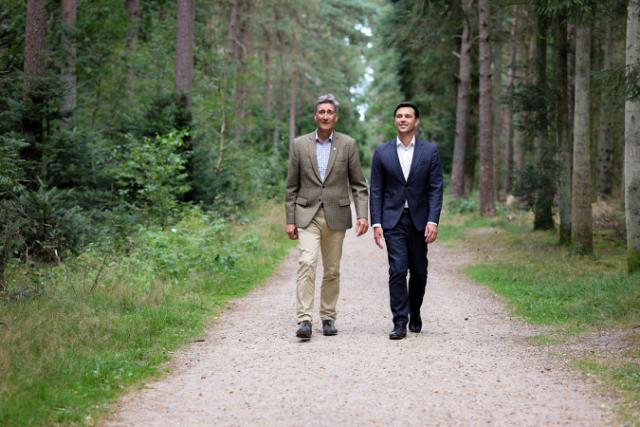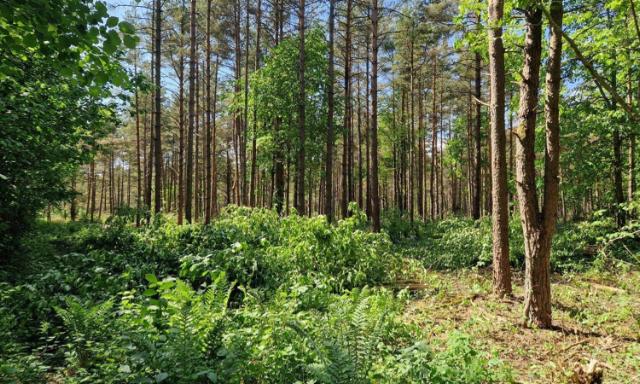
Dalgas participation in biodiversity projects
Dalgas is actively contributing to climate resilience and biodiversity through its involvement in different European initiatives. As a stakeholder in the Horizon Europe-funded Precilience project, Dalgas supports the development of adaptive land-use strategies across the Nordic-Baltic region. Additionally, the company plays a key role in a Latvian-led research project focused on enhancing the resilience and carbon potential of birch–spruce mixed forests, aligning with EU climate and biodiversity goals.
Dalgas in Estonia joins stakeholder committee in Horizon Europe’s Precilience project
Climate warming in European boreal zones is occurring at triple the pace of the global mean. This rapid change is already impacting agriculture and forestry in Denmark, Estonia, Finland, Norway, and Sweden, where extreme weather events, droughts, pests, and diseases are threatening food production, biodiversity, water security, and rural livelihoods. Many prevailing land-use practices — such as crop monocultures and clear-cutting — are not only highly vulnerable to these pressures but also contribute to their intensification. In response, the Precilience project brings together 16 partners to collaborate with farmers, foresters, landowners, and other stakeholders in co-developing practical, science-based solutions to safeguard soil, water, crops, trees, and ecosystems.
Dalgas in Estonia holds a position on the Stakeholder Committee of the Horizon Europe-funded Precilience project. This initiative focuses on co-developing precision solutions with farmers, foresters, landowners, and other key actors to enhance climate resilience in boreal regions. Active in Denmark, Estonia, Finland, Norway, and Sweden, the project aims to create long-lasting impact beyond its duration. Precilience is a €10 million Horizon Europe initiative focused on developing climate adaptation strategies for agriculture and forestry in the boreal regions of Denmark, Estonia, Finland, Norway, and Sweden. Aim of this project is to advance climate adaptations in agriculture and forestry across the Nordic-Baltic Region.
Stakeholder engagement and effective information sharing are essential to the project’s success. Precilience is supported by the European Union’s Horizon Europe research and innovation programme under grant agreement No. 101157094.
Mixtures for future: technology for biodiversity- and carbon-rich commercial birch-spruce stands
Project number
1.1.1.3/1/24/A/099
Project applicant
Latvian State Forest Research Institute “Silava”
Summary
National and European studies have assessed the resilience, sensitivity, regeneration, and productivity of mixed forest stands, concluding that their benefits (compared to pure stands) depend on the tree species involved, the degree of mixture, stand density, and moisture availability. Birch–spruce mixed stands are widespread in the Baltic States and potentially suitable for large parts of Northern Europe. However, research on these stands has been fragmented, and their resilience to stress caused by extreme meteorological conditions has not been characterized.
The aim of the project is to evaluate this additional resilience effect in forests on mesotrophic soils and to develop a technology to maximize its benefits for adaptation, climate change mitigation, and certain components of biodiversity. This will ensure alignment with European Union policies in these areas and contribute to achieving the objectives of Latvia’s Climate Change Adaptation Strategy and the National Energy and Climate Plan.
The project will be implemented within the RIS3 priority area Knowledge-Intensive Bioeconomy as an applied, non-commercial study in the field of agriculture, forestry, and fisheries. The project will be led by senior researcher Roberts Matisons, who has significant experience in managing scientific projects, conducting research, and preparing publications.
The project will contribute to the achievement of key goals of the National Development Programme:
- Development of human resources in science, involving an early-career researcher and two PhD students;
- Cooperation between research institutes and enterprises, involving two forest management companies whose management strategies and staff expertise will enhance the project’s practical relevance.
This collaboration will ensure more effective data collection, analysis for practical application of results, and the development of recommendations necessary for practice and policy-making.
Project partners
- Dalgas – with expertise in practical management of birch and spruce stands and participation in the carbon market, will support the implementation of Task 1.
- OTEMA – with long-standing experience in forestry and specialists knowledgeable in epiphyte research, will participate in Task 3.
Both partners will also contribute to disseminating project results to different target groups.
The overall goal of the research is to strengthen the knowledge base, innovation capacity, and introduction of modern technologies in the forestry and forest science research and development (R&D) system to enhance multifunctionality and competitiveness, while achieving multiple objectives and providing several ecosystem services of economic and ecological significance.
Project objective
To develop a technology to maximize the positive effects of species mixture on the productivity and environmental sensitivity of birch–spruce mixed stands under mesotrophic growth conditions. Given the poor drought adaptation of high-latitude tree populations (Isaac-Renton et al. 2018), water availability is considered the key environmental factor to be mitigated through the establishment of mixed stands.
Project tasks (work packages)
- Productivity: Compare carbon sequestration in mixed and pure stands using a chronosequence approach, including assessment of market value;
- Sensitivity and vulnerability: Assess growth sensitivity to meteorological/climatic conditions in mixed stands, focusing on drought-related factors, and evaluate the effectiveness of such modifiers to improve growth models;
- Biodiversity: Assess biodiversity components to develop solutions for increasing biodiversity enhancement efficiency.
The project results will be made publicly available without discrimination, in the form of open-access datasets and publications.
The project will be conducted as industrial research, and to ensure further development of its outcomes—primarily for integration into forest management decision-support systems, sustainability reporting, environmental and carbon credit certification—the research institution LVMI Silava will organize an open auction and conclude a licensing agreement for the developed technology.
Total project budget
€592,218.59 (ERDF funding: €459,983.96)
Implementation period
36 months (from 01.10.2025 to 30.09.2028).
News from nature
.jpg&width=640&format=webp&quality=75)
Agreement signed for the implementation of LVM GEO internationally
On October 29, "Latvijas valsts meži" JSC (LVM) Board Member Māris Kuzmins and Dalgas a/s CEO Torben Friis Lange signed an agreement on the implementation of the LVM GEO forest management platform in Denmark and Germany.
Lars Larsen Group to Invest €67 Million in Forests in Estonia, Latvia, and Lithuania
As part of Lars Larsen Group’s ambition to contribute to societal growth and value creation, the company has decided to invest in forestry and afforestation in the Baltic region.Dalgas enters new partnership for digital measurement solutions in the forest and wood industry
The products LogStackLIDAR and LogStackPRO from Dalgas are now part of ForestX’s digital portfolio. The new partnership aims to strengthen the digitalization of the forest and wood industry in Europe.Articles and inspiration

Significant tax reform changes for Estonia from 2025
Significant tax reforms, including those pertaining to VAT, corporate taxation, and personal income tax, have been adopted by the Estonian government.
Whitepaper – 10 myths about forest investments
Find out what is true and false assumptions about forest investments.
